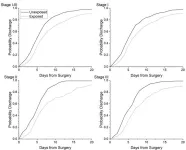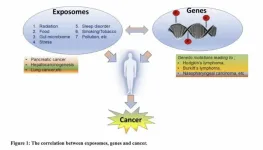(Press-News.org) Workplace culture plays an integral role in the successful adoption of lifestyle medicine programming within health systems, according to a new study published in BMJ Open.
Researchers developed case studies of health systems with lifestyle medicine programming that had a diversity of size, location, payer model and patient population. More than 40 individuals from those health systems, including administrative leaders, physicians and other team members involved in lifestyle medicine programs, participated in the data collection.
The study found that synergistic and supportive practices, such as providing resources to support the formation of collaborative groups (professional development groups, walking groups, etc.), visually advertising lifestyle medicine, and creating a supportive environment by offering healthy plant-based meal options in cafeterias facilitated the implementation of lifestyle medicine programming.
Participants described a supportive workplace culture as key to implementing and sustaining lifestyle medicine programs. This type of culture “was collectively defined as one in which social resources were present, the physical environment supported lifestyle medicine behaviors and colleagues engaged in lifestyle medicine themselves.” Verbal, written, and non-written communication of key values such as trust, gratitude, collaboration and optimism also indicated a supportive workplace culture.
John Hopkins Bloomberg School of Public Health Professor Joel Gittelsohn, PhD, MS, senior investigator on the study, called its findings “incredibly informative and useful.”
“As more health systems integrate lifestyle medicine services, the experiences and best practices of those with successful lifestyle medicine implementation can provide models that inform other systems’ efforts,” Dr. Gittelsohn said “The case study approach was crucial for developing a nuanced and contextually rich picture of the successes and challenges associated with each systems’ experience with lifestyle medicine integration.”
A growing number of health systems, including NYC Health + Hospitals and the U.S. military, are turning to evidence-based lifestyle medicine to help deliver whole-person care and target the quintuple aim of better health outcomes, lower costs, improved patient satisfaction, improved provider well-being and advanced health equity. There are now 116 health systems members from 38 states in the American College of Lifestyle Medicine’s Health Systems Council.
“One thing that is clear from the findings in this paper is that strong leadership support and a unified organizational approach for the implementation of lifestyle medicine is a necessary and powerful facilitator,” Dr. Gittelsohn said. “Health systems that intentionally support lifestyle medicine advocates and promote healthy lifestyle behaviors throughout the organization are seen as ‘walking the walk,’ which helps achieve buy-in from clinicians and patients alike.”
Lifestyle medicine is a medical specialty that uses therapeutic lifestyle interventions as a primary modality to treat chronic conditions including, but not limited to, cardiovascular diseases, type 2 diabetes, and obesity. Lifestyle medicine-certified clinicians are trained to apply evidence-based, whole-person, prescriptive lifestyle change to treat and, when used intensively, often reverse such conditions. Applying the six pillars of lifestyle medicine—a whole-food, plant-predominant eating pattern, physical activity, restorative sleep, stress management, positive social connections, and avoidance of risky substances—also provides effective prevention for these conditions.
About ACLM®
The American College of Lifestyle Medicine (ACLM) is the nation’s medical professional society advancing the field of lifestyle medicine as the foundation of a redesigned, value-based and equitable healthcare delivery system, essential to achieving the Quintuple Aim and whole-person health. ACLM represents, advocates for, trains, certifies, and equips its members to identify and eradicate the root cause of chronic disease by optimizing modifiable risk factors. ACLM is filling the gaping void of lifestyle medicine in medical education, providing more than 1.2 million hours of lifestyle medicine education to physicians and other health professionals, since 2004, while also advancing research, clinical practice and reimbursement strategies.
.
END
Study finds that supportive workplace culture advances implementation of lifestyle medicine in health systems
The findings of the case series provide a framework for other health systems to successfully integrate lifestyle programming.
2025-03-11
ELSE PRESS RELEASES FROM THIS DATE:
USPSTF statement on screening for food insecurity
2025-03-11
Bottom Line: The U.S. Preventive Services Task Force (USPSTF) concludes that the current evidence is insufficient to assess the balance of benefits and harms of screening for food insecurity on health outcomes in the primary care setting. According to survey data, 12.8% of households experienced food insecurity in 2022, with 7.7% of households experiencing low food security and 5.1% experiencing very low food security. Nearly one-third of households with incomes below the federal poverty threshold are food insecure. Food insecurity is one among a multitude of medical, psychological, and social conditions ...
‘Fishial’ recognition: Neural network identifies coral reef sounds
2025-03-11
WASHINGTON, March 11, 2025 – Coral reefs are some of the world’s most diverse ecosystems. Despite making up less than 1% of the world’s oceans, one quarter of all marine species spend some portion of their life on a reef. With so much life in one spot, researchers can struggle to gain a clear understanding of which species are present and in what numbers.
In JASA, published on behalf of the Acoustical Society of America by AIP Publishing, researchers from Woods Hole Oceanographic Institution combined acoustic monitoring with a neural network to identify fish activity on coral reefs ...
Cardiovascular health and biomarkers of neurodegenerative disease in older adults
2025-03-11
About The Study: The findings of this study suggest that promoting cardiovascular health in older adults may help alleviate the burden of neurodegenerative diseases, particularly among Black adults, who are known to experience a higher prevalence of cardiovascular disease.
Corresponding Author: To contact the corresponding author, Anisa Dhana, MD, MSc, email anisa_dhana@rush.edu.
To access the embargoed study: Visit our For The Media website at this link https://media.jamanetwork.com/
(doi:10.1001/jamanetworkopen.2025.0527)
Editor’s Note: Please see the article for additional information, including other authors, author contributions and affiliations, ...
Ethics in patient preferences for AI–drafted responses to electronic messages
2025-03-11
About The Study: In this survey study, participants expressed a mild preference for messages written by artificial intelligence (AI) but had a slightly decreased satisfaction when told AI was involved. Patient experience must be considered along with ethical implementation of AI. Although AI disclosure may slightly reduce satisfaction, disclosure should be maintained to uphold patient autonomy and empowerment.
Corresponding Author: To contact the corresponding author, Anand Chowdhury, MD, MMCi, email anand.chowdhury@duke.edu.
To access the embargoed study: ...
Patients’ affinity for AI messages drops if they know the technology was used
2025-03-11
DURHAM, N.C. – In a Duke Health-led survey, patients who were shown messages written either by artificial intelligence (AI) or human clinicians indicated a preference for responses drafted by AI over a human. That preference was diminished, though not erased, when told AI was involved.
The study, publishing March 11 in JAMA Network Open, showed high overall satisfaction with communications written both by AI and humans, despite their preference for AI. This suggests that letting patients know AI was used does not greatly reduce confidence in the message.
“Every health system is grappling with this issue of whether we disclose the use of AI and how,” ...
New ACS led study finds wildfires pose challenges to cancer care
2025-03-11
Due to the physical, psychological, and socioeconomic consequences of a cancer diagnosis and treatment, people with cancer are especially vulnerable during extreme weather events like hurricanes, tornadoes, and wildfires, which are becoming more common and damaging with climate change. A new national study led by American Cancer Society (ACS) and Harvard T.H. Chan School of Public Health researchers finds patients whose facility was impacted by a wildfire disaster during recovery from lung cancer surgery had longer length of stay (LOS) than similar patients treated at the same facility, but at times when no disaster occurred. The findings are out today in the Journal ...
Scientists discover new heavy-metal molecule ‘berkelocene’
2025-03-11
A research team led by the Department of Energy’s Lawrence Berkeley National Laboratory (Berkeley Lab) has discovered “berkelocene,” the first organometallic molecule to be characterized containing the heavy element berkelium.
Organometallic molecules, which consist of a metal ion surrounded by a carbon-based framework, are relatively common for early actinide elements like uranium (atomic number 92), but they are scarcely known for later actinides like berkelium (atomic number 97).
“This is the first time that evidence for the formation of a chemical bond between berkelium and carbon has been obtained. The discovery provides ...
Repeated esophagogastroduodenoscopy and colonoscopy in the diagnosis of gastrointestinal bleeding
2025-03-11
Gastrointestinal (GI) bleeding is a common and potentially life-threatening condition that requires prompt and accurate diagnosis. Esophagogastroduodenoscopy (EGD) and colonoscopy are the primary diagnostic modalities, but initial examinations may sometimes fail to identify the bleeding source. In such cases, repeated endoscopic evaluations can improve detection rates. This review explores the role of repeat EGD and colonoscopy in diagnosing GI bleeding, highlighting the conditions under which they are most beneficial and the challenges associated with their use.
Incidence and Causes of Gastrointestinal ...
Over 1 in 3 adults in households with guns do not store all in locked locations
2025-03-11
PHILADELPHIA – Since 2017, firearm-related injuries in the United States have been the most common cause of death from injury among children through young adults, ages 1 to 24, surpassing motor vehicle accidents, according to a 2022 study. Access to firearms in one’s home increases the risk of suicide and accidental death.
But over a third of Americans with guns in their homes say they do not store all of them in a locked location (37%), according to the latest health survey from the Annenberg Public Policy Center (APPC) of the University of Pennsylvania. ...
How environmental exposures affect genes and increase cancer risk
2025-03-11
“Environmental exposures may cause genetic damage, lead to mutations in key genes, and/or block the DNA repair mechanisms increasing the risk of cancer.”
BUFFALO, NY – March 11, 2025 – A new editorial was published in Oncotarget, Volume 16, on March 10, 2025, titled “EXPOSOMES and GENES: The duo influencing CANCER initiation and progression.”
In this editorial, Drs. Uzma Saqib, Katherine E. Ricks, Alexander G. Obukhov, and Krishnan Hajela from Devi Ahilya Vishwavidyalaya (DAVV) in Indore, India, discuss how environmental factors, known as exposomes, interact with genes to influence cancer risk. The authors highlight how pollution, diet, ...
LAST 30 PRESS RELEASES:
Study in mice reveals the brain circuits behind why we help others
Online forum to explore how organic carbon amendments can improve soil health while storing carbon
Turning agricultural plastic waste into valuable chemicals with biochar catalysts
Hidden viral networks in soil microplastics may shape the future of sustainable agriculture
Americans don’t just fear driverless cars will crash — they fear mass job losses
Mayo Clinic researchers find combination therapy reduces effects of ‘zombie cells’ in diabetic kidney disease
Preventing breast cancer resistance to CDK4/6 inhibitors using genomic findings
Carbon nanotube fiber ‘textile’ heaters could help industry electrify high-temperature gas heating
Improving your biological age gap is associated with better brain health
Learning makes brain cells work together, not apart
Engineers improve infrared devices using century-old materials
Physicists mathematically create the first ‘ideal glass’
Microbe exposure may not protect against developing allergic disease
Forest damage in Europe to rise by around 20% by 2100 even if warming is limited to 2°C
Rapid population growth helped koala’s recovery from severe genetic bottleneck
CAR-expressing astrocytes target and clear amyloid-β in mouse model of Alzheimer’s disease
Unique Rubisco subunit boosts carbon assimilation in land plants
Climate change will drive increasing forest disturbances across Europe throughout the next century
Enhanced brain cells clear away dementia-related proteins
This odd little plant could help turbocharge crop yields
Flipped chromosomal segments drive natural selection
Whole-genome study of koalas transforms how we understand genetic risk in endangered species
Worcester Polytechnic Institute identifies new tool for predicting Alzheimer’s disease
HSS studies highlight advantages of osseointegration for people with an amputation
Buck Institute launches Healthspan Horizons to turn long-term health data into Actionable healthspan insights
University of Ottawa Heart Institute, the University of Ottawa and McGill University launch ARCHIMEDES to advance health research in Canada
The world’s largest brain research prize awarded for groundbreaking discoveries on how we sense touch and pain
Magnetofluids help to overcome challenges in left atrial appendage occlusion
Brain-clearing cells offer clues to slowing Alzheimer’s disease progression
mRNA therapy restores fertility in genetically infertile mice
[Press-News.org] Study finds that supportive workplace culture advances implementation of lifestyle medicine in health systemsThe findings of the case series provide a framework for other health systems to successfully integrate lifestyle programming.




